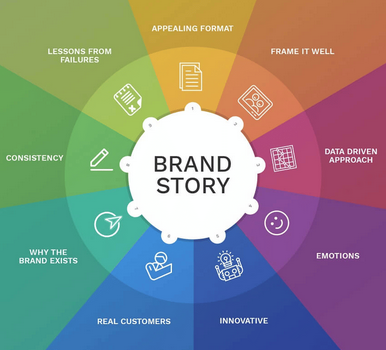Storytelling is a powerful tool in brand building as it allows brands to connect with consumers on a deeper, emotional level. A well-crafted narrative can evoke emotions, build relationships, and create a lasting impression. Here are key aspects of the power of storytelling in brand building:

Human Connection:
Impact: Stories help humanize a brand, making it relatable and resonant.
Benefit: Consumers are more likely to connect with a brand that shares authentic and compelling stories, fostering a sense of trust and loyalty.
Emotional Engagement:
Impact: Stories have the ability to evoke emotions and create a memorable experience.
Benefit: Emotional engagement helps build a stronger bond between the brand and consumers, influencing their perceptions and decisions.
Differentiation and Identity:
Impact: Stories help define a brand’s unique identity and differentiate it from competitors.
Benefit: A distinctive narrative sets a brand apart, making it more memorable and recognizable in a crowded marketplace.
Building Trust:
Impact: Authentic storytelling builds trust by creating transparency and authenticity.
Benefit: Trust is a critical factor in consumer decision-making. Brands that share genuine stories are more likely to establish trust with their audience.
Memorability:
Impact: Stories are easier to remember than facts or features.
Benefit: A memorable story enhances brand recall, making it more likely for consumers to remember and talk about the brand.
Educating and Informing:
Impact: Stories can effectively convey information and educate consumers about a brand’s values, mission, or products.
Benefit: Educational storytelling helps consumers understand the brand’s purpose and offerings, making them more informed and engaged.
Inspiring Action:
Impact: Compelling narratives inspire action by appealing to consumers’ emotions and values.
Benefit: Brands can motivate consumers to take specific actions, such as making a purchase, supporting a cause, or sharing the brand story with others.
Cohesive Brand Messaging:
Impact: Storytelling provides a framework for cohesive brand messaging.
Benefit: A consistent and unified narrative across different platforms and communication channels reinforces the brand’s messaging and values.
Customer Experience:
Impact: Stories contribute to the overall customer experience, guiding consumers through a brand’s journey.
Benefit: A well-crafted story enhances the overall experience, making it more enjoyable and memorable for consumers.
Adaptability and Flexibility:
Impact: Stories can be adapted to various formats, such as written content, videos, social media posts, and more.
Benefit: Brands can reach diverse audiences through different channels, ensuring that the story is flexible and adaptable to various communication mediums.
Creating Brand Advocates:
Impact: Engaging stories can turn customers into brand advocates.
Benefit: Consumers who connect with a brand story are more likely to become loyal advocates, sharing their positive experiences and influencing others.
Timelessness:
Impact: Timeless stories have enduring appeal and relevance.
Benefit: Brands can create narratives that stand the test of time, providing a consistent and enduring message that resonates with consumers over the long term.
In summary, the power of storytelling lies in its ability to create emotional connections, build trust, differentiate a brand, and inspire action. Brands that master the art of storytelling can forge stronger relationships with their audience, fostering loyalty and advocacy.
